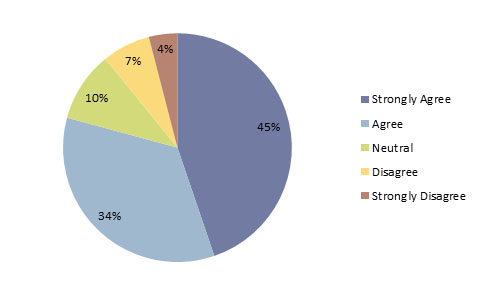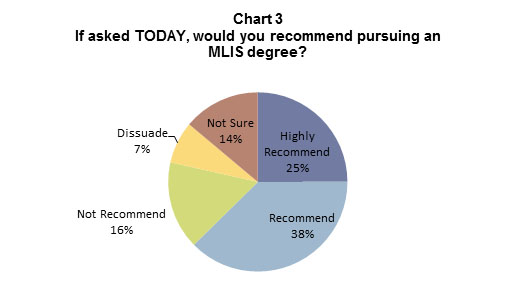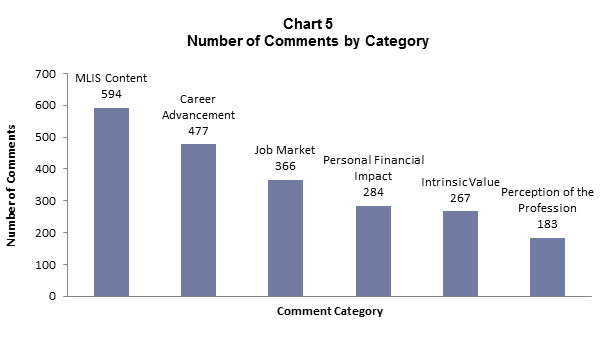In May 2011, librarians, library staff, and library school students weighed in on the LRS 60-Second Survey The Value of an MLIS Degree to You. Almost 2,500 people from every state and 15 countries, representing all library types, responded. Around 1,300 respondents left comments, sharing additional thoughts on the value of the MLIS degree today.
What is a 60-Second Survey?
In the style of an online readers’ poll, LRS’s 60-Second Surveys are short and to the point. Narrow by intent, these surveys capture the perceptions of respondents on a single timely topic. The online surveys are publicized through local, regional, and national library listservs, blogs, etc., and as a result most respondents have some connection to the library profession.
When asked if they thought their MLIS degree was/is worth the time and money invested in it, 4 in 5 respondents (79%) strongly agreed or agreed that their degree was worth the investment (see Chart 1). Eleven percent of respondents disagreed or strongly disagreed with the statement, and 10 percent were “neutral.”
Chart 1
My MLIS Degree Was/Is Worth the Time and Money Invested in It

Respondents who have had their MLIS degree the longest were more likely to indicate that the time and money invested in the MLIS was worth it (see Chart 2). Nine out of 10 (92%) respondents who have had their MLIS for 16+ years strongly agreed or agreed that the degree was worth the investment. Almost 90 percent of respondents who have had their degrees for 11-15 years strongly agreed or agreed that the investment in the MLIS degree was worth it, as did 80 percent of respondents who have had their degrees for 6-10 years. While around two-thirds of newer professionals felt that their investment in the degree was worthwhile, they were less likely to strongly agree and were more likely to be neutral or disagree. Respondents who completed their degree 1-5 years ago were the most likely to indicate that the degree was not worth the time and money they invested in it.
Survey respondents also indicated whether or not they would recommend pursuing an MLIS degree if asked today. Almost two-thirds of respondents (63%) would recommend pursuing the MLIS degree, with one-fourth of respondents indicating they would “highly recommend” the degree (see Chart 3). Close to 1 in 6 respondents would not recommend pursuing the degree, and 7 percent would actively dissuade others from pursuing it. Around 14 percent of the respondents said that they were not sure if they would recommend the degree if asked.

Comment Analysis
An analysis of respondents’ comments offered insights into why respondents would or would not recommend the MLIS degree. Comments were grouped into the following 6 categories and could be coded in more than 1 category (see Chart 5):
- MLIS content: Any reference to MLIS (or equivalent) degree programs and curriculum, including knowledge and skills and/or the need to supplement with additional degrees or experience.
- Career advancement: Any reference to the ability to advance in a library career, including the degree being a requirement.
- Job market: Any reference to the availability of professional positions for MLIS holders and the ease or difficulty in obtaining those positions.
- Personal financial impact: Any reference to the cost of the degree and the salaries earned post-degree.
- Intrinsic value: Any reference to personal values and beliefs related to working in the profession.
- Perception of the profession: Any reference to the public’s or government/policy makers’ view and/or appreciation of librarianship.
Comments were also coded as positive, negative, or neutral/mixed in tone (see Chart 6). Respondents commented predominantly negatively on the job market, the cost of the degree, and the perception of the profession, but they were more upbeat about the degree’s intrinsic value and possibilities for career advancement. Comments relating to MLIS content were the most ambivalent in tone.

“Even before the current economic crash, many employers were cutting professional-level jobs, either replacing them with lower-qualified positions or not replacing them at all, due to the widespread perceptions that the existence of the internet and ebooks make both libraries and librarians unneeded and unwanted.” – Survey Respondent
“The field is just too saturated, and only those who can afford the greatest flexibility in time, money, and geography can get great jobs. I would hope that anyone wishing to pursue the degree, which I do love, would be able to hear that kind of information transparently… just so they know.” – Survey Respondent
“An MLIS is only valuable if it provides flexibility for today’s uncertain job market. Also, I think an MLIS degree is less valuable than it was years ago because the job market has been flooded with too many program graduates, especially since the programs can be done online, anyone anywhere can do it and you don’t have to move to a library school.” – Survey Respondent
Conclusion
The Value of an MLIS to You 60-second survey showed that a majority of respondents would both recommend the degree to others today (63%) and agree that the MLIS is worth the investment of time and money (79%). While a sizeable chunk of respondents would be reluctant to recommend the degree or to say that the MLIS retains its value today, their comments show that any hesitations about recommending the degree stem largely from a weak job market, the financial burden of education, concerns about the content and delivery of LIS curriculum, and a generally negative perception of the profession by the public. Yet, comments about the intrinsic, non-monetary awards of the librarianship, and about opportunities for career advancement, compensate for these drawbacks, especially for those who have had their degrees for more than 15 years. As 1 survey respondent articulated: “Every day I go to work excited about what I do, whether it’s doing story time, visiting classes, doing readers advisory for our patrons or teaching classes to the staff and public, I feel like what I do matters to the quality of life of our individual patrons and to the vibrancy of our community.”
“The degree itself is only half the opportunity. You must also know deeply, and be able to articulate clearly, why you pursued it and what libraries actually mean to you and to society.” -Survey Respondent
For a more detailed analysis of this survey and respondents’ comments, as well as a comparison to LRS’s 2008 Value of an MLIS survey, see the Closer Look Report at: http://www.lrs.org/documents/closer_look/MLIS_Value_Closer_Look_Report.pdf.

